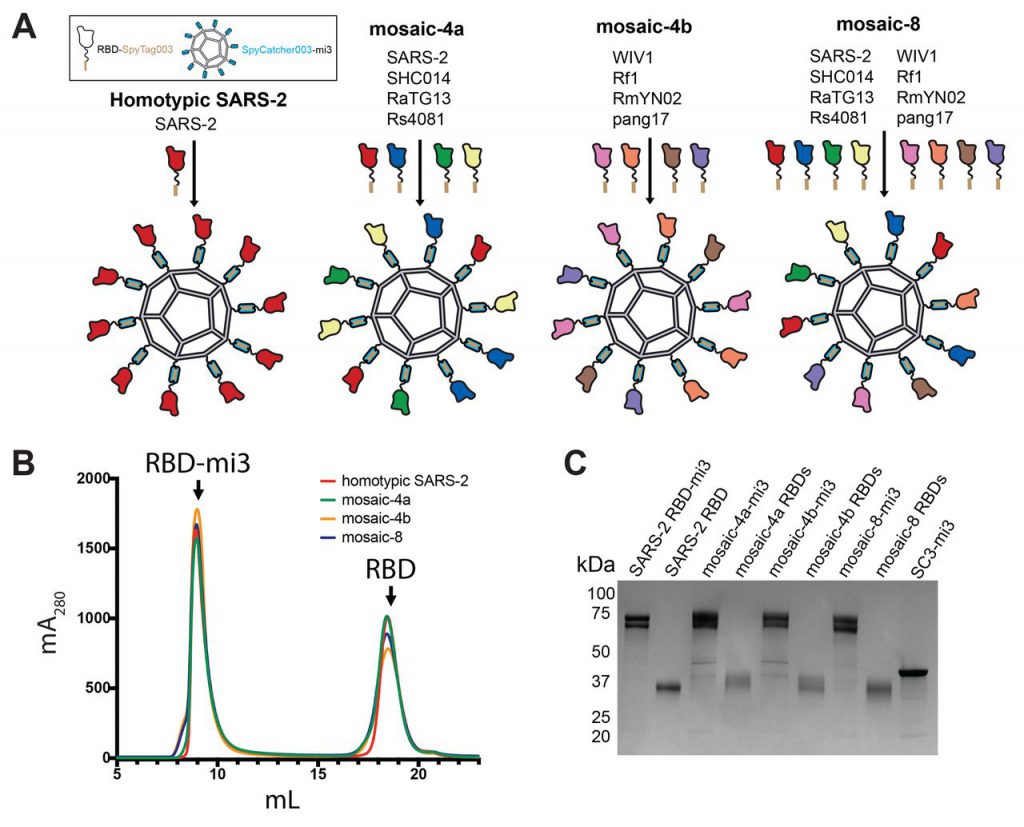
SARS-CoV-2, a newly-emergent betacoronavirus that caused a global pandemic in 2020, is just one of many different viruses in the coronavirus family. Many members of this virus family circulate in animal populations such as bats, and may infect humans like SARS-CoV-2. There is an urgent need for protection against SARS-CoV-2 and SARS-related emergent zoonotic coronaviruses.
Researchers in the laboratory of Pamela Björkman, the David Baltimore Professor of Biology and Bioengineering are working on developing vaccines against a series of related coronaviruses with the purpose of preventing future pandemics. And now a research team, led by graduate student Alex Cohen in the Björkman lab, has designed a protein-based 60-subunit nanoparticle with fragments of up to 8 different types of coronavirus attached to it. When injected into mice, the vaccine induces antibodies that respond to a variety of coronaviruses, including similar viruses that are not present on the nanoparticles. The relevant research results were published online in the journal Science on January 12, 2021, with a tittle Mosaic nanoparticles elicit cross-reactive immune responses to zoonotic coronaviruses in mice.
In this study, these researchers made homotypic nanoparticles displaying the receptor-binding domain (RBD) of SARS-CoV-2 or co-displaying SARS-CoV-2 RBD along with RBDs from animal betacoronaviruses that represent threats to humans (mosaic nanoparticles; 4-8 distinct RBDs). Mice immunized with RBD-nanoparticles, but not soluble antigen, elicited cross-reactive binding and neutralization responses. Mosaic-RBD-nanoparticles elicited antibodies with superior cross-reactive recognition of heterologous RBDs compared to sera from immunizations with homotypic SARS-CoV-2–RBD-nanoparticles or COVID-19 convalescent human plasmas. Moreover, sera from mosaic-RBD–immunized mice neutralized heterologous pseudotyped coronaviruses equivalently or better after priming than sera from homotypic SARS-CoV-2–RBD-nanoparticle immunizations, demonstrating no immunogenicity loss against particular RBDs resulting from co-display.
The researchers believe that a single immunization with mosaic-RBD-nanoparticles provides a potential strategy to simultaneously protect against SARS-CoV-2 and emerging zoonotic coronaviruses. Professor Björkman also expressed that these results indicate that it is possible to improve diverse neutralizing antibody responses, even for coronavirus strains that are not present on the injectable nanoparticles. They hope that this technology can be used to prevent animal coronaviruses from crossing into humans in the future. In addition, they also think the nanoparticles can also cause a neutralizing response to SARS-CoV-2, so it is possible to use them to prevent COVID-19 and other coronaviruses with pandemic potential.
About the author: With years of experience in the pharmaceutical and life science sector, CD Bioparticles is a leading manufacturer and supplier of various nanoparticles that can be widely used in biology and medicine fields, including colloidal gold nanoparticles, silver nanoparticles, silica nanoparticles, titania nanoparticles, inorganic fluorescent nanoparticles (quantum dots and upconverting nanocrystals), and biodegradable polymer nanoparticles. Our nanoparticles are manufactured with different shapes and sizes, and the particle surface can be coated, functionalized or conjugated with biomolecules for research use.
References
1. Cohen, A. A., Gnanapragasam, P. N., Lee, Y. E., Hoffman, P. R., Ou, S., Kakutani, L. M., … & Bjorkman, P. J. (2021). Mosaic nanoparticles elicit cross-reactive immune responses to zoonotic coronaviruses in mice. Science.
2. California Institute of Technology. “Nanoparticle immunization technology could protect against many strains of coronaviruses: Method presents the immune system with several different coronaviruses at once.” ScienceDaily. ScienceDaily, 12 January 2021.
